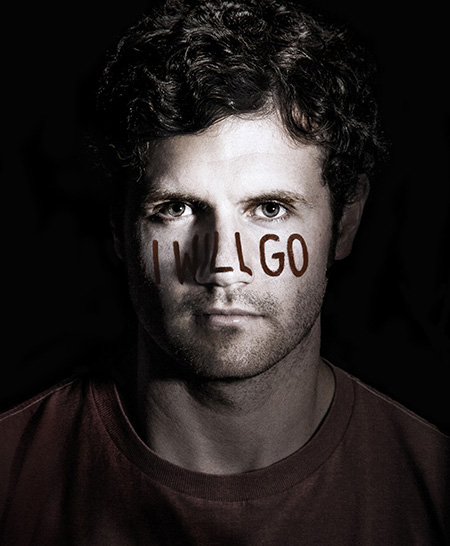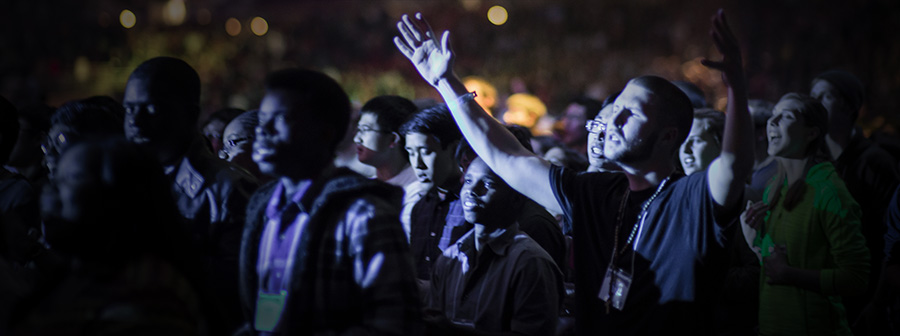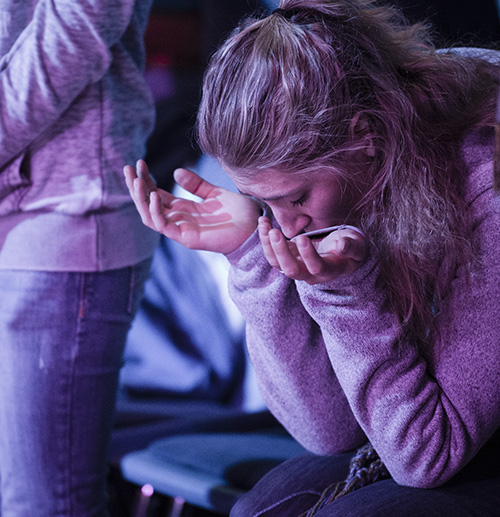Urbana Gets Radical

“What happens when every student in this room makes their primary ambition, their primary plan, their primary dream, the proclamation of the gospel to the nations? When that takes hold in our hearts the very gates of hell will not stop the spread of the gospel to the ends of the earth.”
With such compelling words, David Platt, author of the best-selling book Radical, challenged Urbana’s 16,000 college students to a life of sacrifice, commitment and obedience towards fulfilling the Great Commission. His words were echoed in the testimony of a young Brazilian missionary who declared to the convention: “The forces of darkness tremble, for there’s a new generation of missionaries rising….” Her words were prophetic. Over 4,200 attendees signed up for a long-term missions commitment by the end of the five-day convention in St. Louis.
Urbana 2012 was unique in many ways, and from an historical perspective quite significant. Meeting as a separate track, some 30 international student-mission leaders gathered to plan their own Urbana-like conventions in their countries. It is very likely that the sum-total of attendance in these non-American “Urbanas” will far exceed their North American counterpart. Thus, Urbana is more than just the world’s largest mission conference. It is the epicenter of a global movement to mobilize and equip college students for carrying out the Great Commission in their nations and beyond.
 For this reason, among others, what happened at Urbana 2012 will have significant influence for many years to come, first, because Urbana is helping to shape the next generation of missionaries, as well as future church and mission leaders, and second, because Urbana is in a unique position to influence the missions movement in the non-Western world, which is undeniably the emerging powerhouse in global mission today.
For this reason, among others, what happened at Urbana 2012 will have significant influence for many years to come, first, because Urbana is helping to shape the next generation of missionaries, as well as future church and mission leaders, and second, because Urbana is in a unique position to influence the missions movement in the non-Western world, which is undeniably the emerging powerhouse in global mission today.
The Call to Sacrifice
Paul Borthwick, author of Western Christians in Global Mission, and a speaker at numerous Urbanas, observed that “Urbana 2012 was the most consistent call to sacrificial life and cross-cultural service that I’ve seen in the last five Urbanas…. It used to be said that Urbana was InterVarsity’s gift to the mission community… Urbana 2012 has resumed that theme.” Numerous agencies which partner with Urbana commented on the remarkable level of commitment of students at Urbana 2012. This has led some to wonder whether we are on the verge of a new mission awakening in the United States. Clearly, the Spirit of God is stirring, and not only in this present student generation, but across the entire church. When was the last time that a “missions book” like Radical became a New York Times bestseller with more than one million copies sold?
Even so, the response at Urbana seemed to take everyone by surprise, including the organizers. The atmosphere following David Platt’s plenary address was electric. Within 24 hours, every one of the 4,000 copies of his book Radical was sold out. So many students flocked to hear his seminar the next day, another unscheduled seminar had to be set up to accommodate the demand. What was so compelling about David’s message? It was simply the message of Jesus: Come, take up your cross, and follow me into the hardest and darkest places in the world.
This radical call was heard for five consecutive days. The exclamation point came on the last night when the speaker told her story of serving in Afghanistan, where her husband and nine others lost their lives at the hands of Taliban militants in 2010. There was hardly a dry eye in the convention hall. She and her husband’s journey began at Urbana in the 1960s. Following her testimony came the time for students to make their own commitment. They knew exactly what they were signing up for, and where this journey might take them. Even so, over half those present made a commitment to missionary service, including mid-to-long-term commitments.
Where is Your Mongolia?
Urbana’s current director is Tom Lin, a Chinese-American who was used by God to start a student movement in Mongolia. His journey in mission began in 1993 when he attended Urbana as a Harvard student. This one event completely changed his life. Since that time, in addition to his service in Mongolia with his wife Nancy, he has been instrumental in seeing 16 new student fellowships established on campuses throughout the United States. Speaking with conviction from a life that has been fully spent for Christ, at the end of the convention he challenged the students:
“I invite you to make a decision tonight, and not excuses. Where is your Mongolia? Where is the area where Jesus is inviting you? Is yours Afghanistan? ... Despite the risk and obstacles, I invite you to say, ‘Yes, Lord, here I am.’”
Thousands responded that night, making solemn commitments which Tom called “covenants between you and God.” In addition to committing to long-term missions, over 6,000 also committed to leading an evangelistic Bible study on their campus in the next year. Seminars were specifically designed to train students in how to reach people from non-Christian backgrounds on their campuses. With some of the brightest and best from every country on earth coming to study at American universities, the potential for Urbana’s students to impact the world begins on day one when they return home.
Urbana’s students also raised $800,000 over five days. The funds will be used to help Sat7 broadcast the gospel in the Arab world, and assist in the development of new student mission conferences in non-Western countries. Delegates also made history by funding and assembling World Vision’s largest-ever care-giver kit assembly operation. In one night, students assembled 32,000 medical-supply kits, which will be used to treat as many as 800,000 people in some of the neediest places in Africa.
The Justice Generation
One of the fascinating features of Urbana 2012 was the juxtaposition of evangelism and compassion ministries. The conference organizers made an intentional effort to show an “integrated gospel” which must be both proclaimed and demonstrated. It has been observed that today’s evangelical college students resonate closely with the justice issues of our time. Alongside seminars on reaching the world’s unengaged peoples were seminars related to sex-trafficking, ministering to drug-addicts, environmental care, and partnering with Roman Catholics in mission.
Observers are calling this generation “the justice generation.” Unencumbered by the debates within evangelicalism in past decades, this generation is determined to both share their faith evangelistically and live out their faith compassionately. The message they are sending is clear: we don’t have to choose between proclamation and demonstration. We are called to share and live, to be the voice as well as the hands and feet of Christ in our generation. The justice generation wants to change the world—and in a way no other generation has succeeded in doing. One cause promoted at Urbana, Live 58, calls for the eradication of extreme poverty by the year 2035.
To be sure, some have been alarmed by this kind of radical optimism, seeing in it shadows of the social-gospel, liberalism, and the kind of shifting priorities that led to the decline of the Student Volunteer Movement following World War I. Indeed, Urbana’s director from the 1970s, and former head of the World Evangelical Alliance, David Howard, observed at Urbana’s press conference that over the last few decades InterVarsity has faced pressure to compromise on the central focus of fulfilling the Great Commission. He warned from his own study of history and from his interaction with students in the 1970s that there is always the threat of sidelining the eternal priorities of the gospel mandate:
In 1920 the Student Volunteer Movement made a knowing and deliberate turn from the founders’ intent. They said we want to talk about war, economic poverty and racism, and we’re going to rid the world of those things.... They did not rid the world of those things. I believe God brought those things to our mind so that InterVarsity was able to keep our focus on Jesus’ command to get the gospel to the whole world. I’ve prayed every day for months now for this convention that God would help them to keep the focus of what the whole purpose of the thing really is…. We’ve gone through cycles on this, and I hope that this will be a cycle where it continues on with the main focus.
 While others may be dismissive of David’s perspective, it is hard to deny the facts of what became of the Student Volunteer Movement almost a century ago. Will history repeat itself, or will a new generation demonstrate a model of integral mission that not only transforms the church, but the nations as well? In this regard David Platt also seems to be leading the way. He told the convention about a time when his church had $500,000 sitting in the bank, saved up, he said, for a rainy day. He challenged his board to give it all to help Compassion International save kids’ lives in India—because for them, their rainy day was now.
While others may be dismissive of David’s perspective, it is hard to deny the facts of what became of the Student Volunteer Movement almost a century ago. Will history repeat itself, or will a new generation demonstrate a model of integral mission that not only transforms the church, but the nations as well? In this regard David Platt also seems to be leading the way. He told the convention about a time when his church had $500,000 sitting in the bank, saved up, he said, for a rainy day. He challenged his board to give it all to help Compassion International save kids’ lives in India—because for them, their rainy day was now.
Not Radical Enough?
Did the two billion who have yet to hear of Christ among the world’s 8,000 remaining unreached peoples get the attention they deserved at Urbana? It’s hard to say. One of the risks to the cause-driven orientation of the “justice generation” is the tendency to “silo” within causes. Thus while seminars on unengaged peoples may have been well attended, this priority issue was just one cause among many. To be sure, this is reflective of the church at large. Tragically, after 40 years of the frontier mission movement, ninety percent of missionaries continue to go to places where the church has already been established. As a result, almost 2,000 years since Jesus gave his church the Great Commission, close to 3,000 people groups have yet to receive their first missionary. Surely there can be no greater injustice than to live and die having never heard the gospel. For the estimated 50,000 people who perish each day among unreached peoples, that is their reality. Shouldn’t this message be heard loud and clear in every pulpit on every Sunday until it is no longer true that a single soul exists on this planet without access to the good news of Jesus Christ? Shouldn’t the same be true of every plenary and seminar at Urbana—no matter what the subject? But perhaps that’s too radical.
Even so, the great legacy of Urbana has been organizers’ willingness to listen to feedback and engage mission agencies in an effort to serve them better. Urbana 2012 was unquestionably a boost to the global cause of Christ and will accelerate the fulfillment of the Great Commission. The greatest need now is an effective mechanism for follow-up. Urbana depends upon its mission partners for this, but the reality is that few agencies are equipped to walk students through the journey from commitment to long-term service. What is needed is a program and vision for Great Commission discipleship which committed students can get plugged into right away.
 Over thirty years ago, the need for better follow-up at Urbana gave birth to the Perspectives movement, when David Howard and Ralph Winter teamed up after Urbana 1973. David provided the names and addresses of every Urbana student and Ralph created a course that has truly impacted an entire generation. Indeed, in the interval between Urbanas, Perspectives will impact as many or more over fifteen weeks than those who attend the five-day Urbana event. Thus, as one of the fruits of Urbana, Perspectives has effectively doubled the impact.
Over thirty years ago, the need for better follow-up at Urbana gave birth to the Perspectives movement, when David Howard and Ralph Winter teamed up after Urbana 1973. David provided the names and addresses of every Urbana student and Ralph created a course that has truly impacted an entire generation. Indeed, in the interval between Urbanas, Perspectives will impact as many or more over fifteen weeks than those who attend the five-day Urbana event. Thus, as one of the fruits of Urbana, Perspectives has effectively doubled the impact.
While this is tremendous, the reality is that even Perspectives is missing a next step. That next step probably looks something like an online social network that connects Great Commission Christians, enabling team work, mentoring and ongoing learning. What if by the next Urbana in 2015 such a tool and program could be made available? Very likely it wouldn’t be confined to students for very long!
Urbana 2012 will no doubt be remembered for many things—from the multi-cultural worship in the plenaries, to the social-entrepreneurial “launch lab”, to the unprecedented commitment of the justice-generation. But with absolute certainty its most lasting legacy will be those who find eternal life in Christ among the hardest and darkest places. Indeed, the current president of the International Fellowship of Evangelical Students, Daniel Bourdanne from Chad, is a believer today because decades ago a college student came to Urbana, heard the call of Christ, and gave up everything to come live among his tribe. May his same story be told 8,000 more times in this generation!









comments